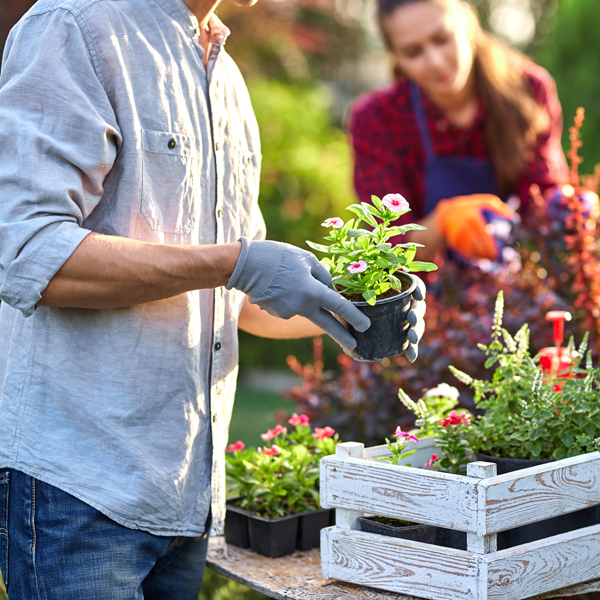The Very Best Gardening Plants for Low-Maintenance and High Award
The Very Best Gardening Plants for Low-Maintenance and High Award
Blog Article
Opening the Advantages of Horticulture: A Comprehensive Take A Look At the Different Types and Their Influence On Health
Exploring the complex advantages of horticulture exposes a range of techniques that significantly improve individual well-being. From veggie and herb yards to container and increased bed setups, each type offers distinctive benefits that prolong beyond simple growing. These activities not just foster physical health and wellness through energetic engagement yet likewise add to mental wellness by relieving stress and anxiety and motivating mindfulness. As we analyze these diverse gardening methods, it becomes obvious that their effect can reverberate on individual, social, and ecological levels, triggering a more detailed look at how these connections form a natural narrative of all natural health and wellness.
Sorts Of Horticulture

Blossom gardening, one more popular group, emphasizes the aesthetic appeal of cultivated flowers. This type can improve landscapes and advertise biodiversity by drawing in valuable pollinators. Similarly, herb horticulture includes growing aromatic and culinary plants, contributing both to cooking and all-natural solutions.
Container gardening deals versatility, enabling people with minimal room to participate in horticulture by utilizing pots and planters. This approach is especially preferred in metropolitan setups. Increased bed horticulture, on the various other hand, includes developing elevated stories that improve dirt drain and access, making it less complicated for gardeners to handle their plants.
Last but not least, neighborhood horticulture cultivates partnership amongst people in common spaces, promoting social communication and cumulative responsibility. Each type of horticulture serves distinct functions and provides to different preferences, making gardening a functional task that can be customized to individual needs and settings.
Mental Health And Wellness Advantages
Taking part in various kinds of gardening not just produces tangible benefits such as fresh produce and lovely flowers but also supplies significant mental wellness advantages. Study shows that horticulture can be an effective tool for decreasing anxiety, anxiousness, and depression. The act of often tending to plants and cultivating a yard cultivates a sense of purpose and success, which can enhance general emotional well-being.
Moreover, gardening urges mindfulness, as it requires people to concentrate on the present minute, whether it be growing seeds or nurturing growth. This mindfulness method can bring about minimized rumination and enhanced mood security. The blog exposure to natural settings during horticulture has actually likewise been linked to improved cognitive functioning and decreased sensations of fatigue.
Social communication plays a crucial role in mental health, and community horticulture efforts provide opportunities for individuals to get in touch with others, promoting a feeling of belonging. The common experience of horticulture can cultivate relationships and assistance networks, additionally bolstering emotional resilience.
Physical Health And Wellness Benefits
Several individuals may not realize that gardening additionally provides substantial physical health and wellness benefits. Participating in horticulture activities needs an array of physical activities, including bending, lifting, digging, and growing, which collectively add to improved toughness, flexibility, and endurance. These activities can enhance cardiovascular wellness by promoting a raised heart price, consequently decreasing the threat of heart illness.
In addition, gardening can act as a moderate-intensity workout, aiding individuals accomplish advised physical activity degrees. Research studies show that routine engagement in gardening can shed considerable calories-- roughly 200-400 calories per hour, depending upon the intensity of the tasks performed. Such calorie expense is helpful for weight management and overall metabolic health.
In addition, direct exposure to sunshine during horticulture can assist in the synthesis of vitamin D, which plays a necessary function in keeping bone wellness and supporting immune function. Moreover, the act of gardening commonly includes working with soil, which has been connected to prospective psychological and physical health and wellness benefits due to the presence of valuable microbes. Gardening.
Social Links With Horticulture
The common elements of gardening foster significant social links amongst individuals. Neighborhood gardens, specifically, function as dynamic centers where individuals from varied backgrounds integrated, cultivating not just plants but also partnerships. These common areas urge collaboration, permitting individuals to trade knowledge, skills, and sources, therefore boosting their gardening experience and fostering a feeling of belonging.
Engagement in gardening tasks commonly causes the development of friendships and support networks. Individuals regularly unify for usual objectives, such as growing periods, harvest parties, or instructional workshops, which strengthen interpersonal connections and produce a sense of neighborhood. Such interactions can relieve feelings of seclusion and boost psychological health, as individuals find companionship and camaraderie in shared undertakings.

Environmental Influence of Gardening
Horticulture significantly adds to environmental sustainability in numerous methods. One of one of the most significant benefits is the improvement of biodiversity. Home yards give crucial habitats for different species, consisting of pollinators such as bees and butterflies, which are essential for environment health. By growing diverse plant types, gardeners can create a well balanced environment that supports both flora and animals.
Additionally, gardens play an essential role in water preservation. Well-planned landscapes, consisting of indigenous plants and xeriscaping, lower water use and stop drainage, thus safeguarding regional rivers from contamination.
Conclusion

The varied kinds of horticulture-- consisting of vegetable, flower, herb, container, and raised bed-- contribute to psychological and physical wellness, foster social links, and promote environmental sustainability. By engaging in gardening practices, individuals can experience improved quality of life while also sustaining community bonds and ecological health.
Report this page